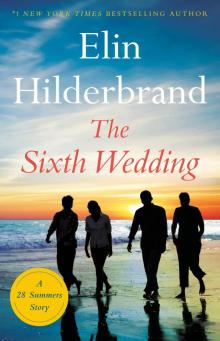- Home
- Elin Hilderbrand
Winter Solstice Page 4
Winter Solstice Read online
Page 4
“The caterer suggested a mashed potato bar,” Mitzi says. “It’s a thing. They make a big pot of mashed potatoes, and then there are dishes of toppings—scallions, cheddar cheese, sour cream, bacon…”
“Bacon?” Kelley says, perking up. “You agreed to bacon?”
“I know it’s your favorite,” Mitzi says.
“Was my favorite,” Kelley says. Does he have to remind Mitzi that she forbids him from eating bacon—as well as sausage, ham, pulled pork, hamburger, meatballs of any kind, veal chops, marbled steak, dark-meat chicken, and “fatty” fish such as salmon?
“I’ve had a talk with Laura—” Mitzi says.
“Lara,” Kelley says. “Her name is Lara. Not Laura. You have to pronounce it correctly or she gets upset.”
Mitzi nods, though Kelley is certain she didn’t process the correction. “Laura seems to think it’s fine for you to eat the foods you love. She was very persuasive.”
“You mean, you agree with her?” Kelley says.
“Yes,” Mitzi says, and she gives Kelley another lovely kiss. “I want you to be happy.”
She’s given up on me, Kelley thinks. If she doesn’t care if I eat bacon, then I really must be a lost cause.
Maybe Mitzi has fallen in love with the caterer. Maybe the caterer is one of these hipster types with a man bun.
“There are going to be glass apothecary jars filled with candy,” Mitzi says. “Jawbreakers, caramels, Necco wafers, Pixy Stix. It seemed like a natural fit at a Halloween party.”
“But it’s not a Halloween party,” Kelley says. “It’s a birthday party. We aren’t wearing costumes.” He pauses. They had better not be wearing costumes! What would he go as? Man Sitting on Death’s Door?
“I might wear a costume, since I’m the hostess,” Mitzi says. She stands up. “I’d like to wear my gold roller-disco outfit, the one with the matching headband and wristbands. Do you know the one I mean?”
“Um?” Kelley says. He knows exactly the one Mitzi means, because it was this very outfit that Kelley set on fire in their bathtub after Mitzi left Kelley for George Umbrau, the Winter Street Inn Santa Claus, nearly three years earlier.
“You do know the one, right?” Mitzi asks. “I mean, I only had one gold jumpsuit.” She opens the door to their closet. “But I’ve looked everywhere and I can’t find it. Where could it be?”
Kelley is not too sick to recognize the right course of action. He leans back into his pillows, closes his eyes, and pretends to be asleep.
EDDIE
Finally Eddie’s job of working the phones pays off!
It’s the lowest job on the real estate office totem pole. On a normal day Eddie fields calls, each more inane and frustrating than the last. People call looking to rent a house for the first two weeks of August. They would like it to sleep eight and be on the beach or within short walking distance, and their budget is five thousand dollars. Total. On a good day Eddie responds to such a query with “Do you have any wiggle room with the price? If not, then how about the number of bedrooms or the location? I have a lovely upside-down house in Tom Nevers that sleeps six and rents for forty-five hundred a week. It’s a short drive from the beach. It just came on the market for the two weeks you’re looking at.” On his bad days Eddie says, “The kind of house you’re describing, ma’am/sir, would rent for nearly ten times your budgeted amount. Large beachfront rentals in August start at twenty thousand dollars a week. That’s where they start.” Eddie then pauses, waiting for the caller to hang up.
Most cold calls are rentals. People who are in the market to sell already have a broker, and if they are no longer on favorable terms with that broker, they hire that broker’s worst enemy. (Eddie got plenty of clients this way in his previous life, people defecting from Addison Wheeler and, yes, Glenn Daley.) People in the market to buy are usually referred to a broker by their financial adviser or the guy they play squash with, or they use the broker who helped them when they were merely renters.
It’s exceedingly rare that someone cold-calls looking to buy, and buy big, but that’s exactly what happens when Eddie picks up the phone.
The woman introduces herself as Masha.
“Masha?” Eddie says. The name sounds vaguely Russian, which unfortunately leads Eddie to think about his crew of call girl housecleaners, who have all been banished back to Kyrgyzstan. “M-a-s-h-a?”
“No, Masha,” the woman says. “Like, ‘Masha, Masha, Masha.’” Pause. “From The Brady Bunch.”
“Oh, Marcia,” Eddie says. The woman’s accent is straight out of Jeremiah Burke High School in Dorchester and Eddie knows not to get his hopes up. People from Dorchester, Jamaica Plain, Brockton, and Fall River don’t buy houses on Nantucket. People from those towns generally don’t come to Nantucket at all because they don’t like paying sixteen dollars for a turkey sandwich, nine dollars for a Bud Light, or five dollars for a gallon of gas. “My name is Eddie, Marcia. Eddie Pancik. What can I help you with today?”
“My husband, Raja, and I…”
Raja sounds vaguely Indian, and Eddie wonders if Raja is a tech millionaire or, possibly, a professor of astrophysics at MIT. But then Eddie calculates in Marcia’s muscular accent and realizes the husband’s name is Roger.
“Yes?” Eddie says patiently, though he can already tell this woman will be spending her summer vacation at the Shady Rest Motel up-beach in Revere. All is not lost for Marcia and Roger, however; there is an excellent clam shack near the Shady Rest.
“We won Powerball,” Marcia says. “The lottery? So now we want to buy a house on Nantucket. We want to look at everything you’ve got between ten and fifteen million.”
Eddie takes a second to clear his throat. “Well, all right, then,” he says. His hopes feel like soap bubbles, iridescent and delicate. He waits for them to pop, one by one. Marcia and Roger won Powerball, and out of the twenty-something real estate agencies on Nantucket they have called Bayberry Properties and reached Eddie Pancik on the phone to find them a ten-to-fifteen-million-dollar house. What are the chances? Eddie reminds himself that there are phonies and fakers out there—unsophisticated pranksters and more-nefarious Talented Mr. Ripley types. But this Marcia sounds earnest, her accent genuine. Eddie grew up on Purchase Street in New Bedford; he should know. “Let’s schedule a day for you to visit, and I’ll set up the appointments.”
As soon as Eddie hangs up the phone, he Googles the names. Roger and Marcia Christy of East Boston pop up right away in a sidebar of the Boston Herald. The couple won $132 million from a lottery ticket that they bought from Lanzilli Groceria in Orient Heights near Constitution Beach.
They’re for real! Eddie thinks. A hundred thirty-two million. If they took the payout, they probably ended up with eighty million, and after paying 40 percent in taxes, they’re left with forty-eight million. So a ten-to-fifteen-million-dollar investment in real estate seems reasonable. The Christys are coming to Nantucket next Friday for the weekend, and Eddie will set up at least six houses for them to look at. He will take them to lunch someplace charming but modest—either the Nantucket Pharmacy lunch counter or Something Natural. He will chauffeur them around in Barbie’s new Escalade, since Eddie and Grace are sharing a sixteen-year-old Jeep Cherokee that has a weird, persistent smell of old popcorn.
Eddie rubs his hands together. If he can sell the Powerball Christys a house, he will officially be back.
He tells Allegra he’s taking lunch—normally, he works right through it—but he’s too excited to eat, so instead he decides to go for a walk. It’s a crisp, beautiful fall day on Nantucket. The trees on Main Street are ablaze with color, but the first frost has yet to arrive, so all the chrysanthemums and dahlias in the window boxes are still blooming. If the Christys could see Nantucket right now, today, they would buy in a heartbeat. This is the most charming island in the world, in Eddie’s opinion—a whole different planet from East Boston. The homes in town are not just aesthetically pleasing; they’re old, they have architectural integrity,
they contain stories—stories of the whaling heyday, captains and crews, men lost at sea, men returned safely to loved ones, stories of Quakers and Unitarians, Native Americans and Cape Verdeans, stories of love, betrayal, death, achievement, failure, hope, faith, family. Eddie tears up a little, thinking about how lucky he is to live in so authentic and singular a place. Most people think real estate is a business about property and therefore money, but Eddie would argue that real estate is a business about people.
And about money.
His tears are partially those of relief. If he can split the difference and sell the Christys a house for twelve-five, he’ll get a $375,000 commission, a third of which will go to the office, still leaving him with a quarter of a million dollars.
Breathing room. He might even be in a position to start house hunting himself.
He considers walking home to Lily Street to tell Grace the news, but he’s torn. On the one hand, he has vowed to be more open and emotionally available to Grace, to share what’s going on in his “interior life,” and right now what he’s feeling is cautiously optimistic. But on the other hand, Eddie is superstitious. He feels that as soon as he discloses the prospect of good news, it will evaporate. The Christys will cancel their trip on Friday, saying they have decided to buy on Martha’s Vineyard instead. Or they will have done further exploring on the Internet and decide to go with a different real estate company, most likely Addison Wheeler or, the worst-case scenario, Rachel McMann. There are a million things that can go wrong, Eddie knows. He decides to wait and tell Grace after he spends the day with the Christys.
On his right Eddie passes Winter Street, and he stops. The Winter Street Inn is there at the end of the block, and Eddie wonders if he should stop by to see the Quinns and ask if there is anything he can bring to the party next week. Would it seem rude, popping by unannounced? Grace told Eddie that she was surprised the Quinns were throwing a party because she had heard that Kelley Quinn was quite sick. Prostate cancer or brain cancer, she couldn’t recall which. Eddie chided Grace for repeating rumors. The gossip on this island was toxic. Hadn’t they learned that much?
Eddie strolls down Winter Street, deciding that he will pop in to say hello, not least of all because he’s feeling a bit peckish, and the inn is famous for serving homemade snacks like warm cheddar tartlets and sweet-and-spicy pecans throughout the day.
Eddie steps up to the front door and uses the knocker.
A long moment passes with no answer, long enough for Eddie to think that nobody is home. But is that likely? At an inn? But then the door swings open and Mitzi is standing before him, her cheeks rosy, her hair mussed. She smiles, but he can tell she doesn’t quite recognize him. Can he blame her? He hasn’t seen her in a number of years. The last Christmas Eve party Eddie attended here at the inn, Mitzi was mysteriously absent, and there were rumors about that, to be sure, something about Mitzi having an affair with Santa Claus, too weird and fantastical to believe.
“Hi, Mitzi,” Eddie says. “It’s Eddie, Eddie Pancik.”
She still looks uncertain, and so Eddie resorts to use of his loathsome nickname. “Fast Eddie.”
He watches this click into place. Her face lights up with recognition, if not with actual joy. “Eddie!” she says. “I’m so sorry! You must think me dreadfully rude. It’s just… well, I wasn’t expecting anyone, least of all you. You’re home, then? Back on Nantucket? For good?” She seems to be scrambling for the proper way to ask if Eddie has been released from jail. He has found the best way to deal with people is to be straightforward.
“Back home,” he says. “I served my time. I’m a new man.”
“Well, that’s good to hear,” Mitzi says. “Not that there was anything wrong with you before. Listen, if anyone knows about losing one’s way for a while, it’s me—as I’m sure you’ve heard.”
Eddie isn’t sure what to say. Maybe the rumors about Mitzi running away with the inn’s Santa Claus are true, then. And yet, here she is, answering the door, looking as pretty and fresh as ever. Still with the long skirts and the dangly earrings, like she just returned from a Peter, Paul and Mary concert.
“Grace and I got your invitation,” Eddie says. “Unfortunately, Grace has volunteer duties she can’t escape from, but I will be attending your party with my daughter Allegra.”
“How lovely!” Mitzi says. She holds the door open a little wider. “Please, come in for a minute, won’t you?”
“Well, I don’t see why not,” Eddie says, motivated by the possibility of a few warm cheddar tartlets. “Although I really just stopped by to give you my RSVP in person and to see if I can bring anything.”
“Now, remind me, Eddie,” Mitzi says as she leads Eddie through the inn’s living and dining rooms to the spacious, airy country kitchen. Eddie scans the counter for tartlets or nuts or muffins, but all he sees is an open bag of kale chips. He feels like maybe he’s made a mistake in dropping by. If he remembers correctly, Mitzi is a talker. He might be held hostage for the remainder of the afternoon. “I lose track of other people’s children so quickly. Are the twins still in high school?”
“They graduated in 2016,” Eddie says. “So right now Hope is a sophomore at Bucknell. And Allegra is living at home with Grace and me. Turns out, college wasn’t for her. She’s working with me at Bayberry Properties right now, trying to figure out her next step.”
“College isn’t for everyone, Eddie,” Mitzi says. “And there’s no reason to be ashamed. Until recently Kelley and I had three out of our four adult children living at home. Now, thankfully, Kevin has a place of his own, and Ava has moved to New York. So we only have Bart. He’s also trying to figure out his next step. He’s been trying for ten months.”
“He’s a war hero,” Eddie says.
“This is true,” Mitzi says. “But he still has his entire life ahead of him. All he does is… sit in his room.” She looks at Eddie and her eyes fill with tears. “I don’t know what to do. He won’t see a therapist. I’m throwing this party mostly to get him out of the house, to get him out among the living again.”
Eddie nods and arranges his face to appear sympathetic, although he feels uneasy. As his wife, Grace, will gladly tell you: Eddie is unqualified to be anyone’s therapist. “How’s Kelley doing?” he asks, hoping to change the subject.
At this, the tears fall. “He’s dying,” Mitzi says. “His doctor says two, maybe three, months at the most. He has an inoperable tumor on the brain that is rapidly encroaching on his basic functions. He lost sight in his left eye. He has tumors on three of his vertebrae. And you know what? He’s as cheerful as I’ve ever seen him. He doesn’t seem to mind that he disappears a little more each day. He doesn’t seem to care that he’s leaving us behind. I mean, what am I going to do?” Mitzi tilts her head toward the ceiling, tears streaming down her face, and Eddie feels genuinely awful. Poor Mitzi! Her son has some form of PTSD, most likely, and her husband is dying. By comparison, Eddie’s problems seem very small indeed. He has to answer the phones—so what? His house is only seven hundred square feet—boohoo! At least Grace and the girls are healthy. All the hardships Eddie is enduring right now he has brought upon himself. He needs to remember that.
He wants to reach out to Mitzi. Should he hug her? He thinks not. That’s how affairs get started. Not that Mitzi would ever be interested in him, although he does think he’s a sight better looking than Santa Claus.
“What can I do?” he asks. “How can I help?”
Mitzi wipes the tears from her face with a dish towel. “You can sell the inn for me.”
“Really?” Eddie says.
“I can’t run it anymore,” Mitzi says. “I won’t be able to run it without Kelley, even if Bart helps.”
“Are you sure?” Eddie says. Obviously, he would love to take on the inn as a listing, but he doesn’t want Mitzi to make any snap decisions while she’s emotional.
“I could probably make it work for a little while,” Mitzi says. “But I don’t want to. Kelley an
d I were getting burned out on it a few years ago, which is part of the reason why…” Here she stops and waves a hand in front of her face, as if clearing away a cloud of gnats or a bad smell. “Why we had all of our issues. I think Kelley approached you about selling the inn a few years ago, didn’t he?”
“He may have mentioned something about it,” Eddie says. He remembers that at the last Christmas Eve party Eddie attended, Kelley was quite keen to sell the inn. But Eddie never heard anything further, so he assumed it was a dead end, like so many others.
“You’re the only broker Kelley likes,” Mitzi says. “He thinks you’re a hustler.” She blinks. “In a good sense. You hustle. You work hard, nose to the grindstone. You get results.”
“I understand,” Eddie says. He surveys the kitchen for any snacks he may have missed. He’s starving. “I’ve always loved this inn.”
“We’ve made some capital improvements,” Mitzi says. “Kelley’s ex-wife, Margaret Quinn? The news anchor? She lent Kelley some money—gave him some money, really—that he then poured back into the building.”
“I would be happy to sell the place for you,” Eddie says. “And I could get you a wonderful price, I’m sure.” Without seeing upstairs, he’s thinking of listing at seven and a half million, and settling on six-five or seven. If he has the listing and the buyer, he will be looking at a payday of over four hundred grand. “But why don’t we wait until you’re absolutely sure.”
“I am absolutely sure,” Mitzi says, and her voice takes on an affronted tone that Eddie recognizes from Grace. The tone says: Are you not taking me seriously because I’m a woman?
“Okay, then,” Eddie says. “Let’s get together sometime after the party, and we’ll write up a listing sheet.”
Mitzi exhales in a long stream of relief. “Thank you,” she says.

 What Happens in Paradise
What Happens in Paradise Reunion Beach
Reunion Beach The Sixth Wedding
The Sixth Wedding 28 Summers
28 Summers Summer of '79: A Summer of '69 Story
Summer of '79: A Summer of '69 Story Troubles in Paradise
Troubles in Paradise The Perfect Couple
The Perfect Couple Winter Solstice
Winter Solstice Barefoot: A Novel
Barefoot: A Novel